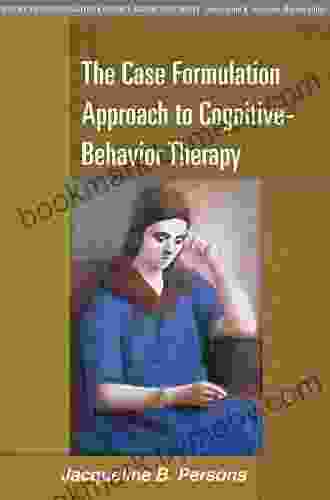Unlock the Transformative Power of Cognitive Behavior Therapy: A Comprehensive Guide to The Case Formulation Approach

In the ever-evolving field of mental health treatment, Cognitive Behavior Therapy (CBT) has emerged as a leading approach, gaining widespread recognition for its scientific rigor and effectiveness. The Case Formulation Approach to CBT takes this approach to the next level, providing therapists with a structured and comprehensive framework for understanding and treating complex mental health conditions. This article will delve into the intricacies of The Case Formulation Approach, exploring its key components, benefits, and applications, empowering you with the knowledge to navigate the path to lasting mental well-being.
4.6 out of 5
| Language | : | English |
| File size | : | 5688 KB |
| Text-to-Speech | : | Enabled |
| Screen Reader | : | Supported |
| Enhanced typesetting | : | Enabled |
| Word Wise | : | Enabled |
| Print length | : | 289 pages |
The Case Formulation Approach: A Cornerstone of CBT
The Case Formulation Approach is a systematic process that involves gathering and organizing information about a client's presenting problems, ensuring a thorough understanding of their unique circumstances and experiences. This in-depth analysis forms the foundation for developing tailored interventions and treatment strategies, maximizing the likelihood of positive outcomes.
At the heart of The Case Formulation Approach lies the creation of a case formulation, which is a written document summarizing the client's key problems, their underlying causes, and maintaining factors. This comprehensive document serves as a guiding map for therapists, enabling them to pinpoint the specific areas that require targeted intervention.
Key Components of The Case Formulation Approach
The Case Formulation Approach comprises several essential components that interweave to create a robust and individualized treatment plan:
- Assessment: The initial step involves gathering information through interviews, psychological testing, and observational data. This thorough assessment paints a clear picture of the client's presenting problems, their history, and their current functioning.
- Problem Identification: Based on the assessment, therapists meticulously identify the client's specific difficulties, whether they be emotional, cognitive, or behavioral. These targeted problem areas become the focal points of the subsequent intervention.
- Etiology: The Case Formulation Approach seeks to uncover the underlying causes of the client's problems. Therapists explore past experiences, developmental factors, and biological influences to gain a comprehensive understanding of the problem's origins.
- Maintaining Factors: Identifying the factors that perpetuate the client's problems is crucial. These maintaining factors can include ongoing stressors, maladaptive coping mechanisms, or negative thought patterns.
- Treatment Plan: Armed with an in-depth case formulation, therapists collaborate with clients to develop a personalized treatment plan meticulously tailored to their specific needs. This plan outlines the therapeutic interventions, goals, and strategies to be employed.
Benefits of The Case Formulation Approach
The Case Formulation Approach offers a myriad of benefits that enhance the therapeutic process and contribute to improved outcomes for clients:
- Enhanced Understanding: The comprehensive assessment and analysis involved in The Case Formulation Approach lead to a profound understanding of the client's problems, fostering a strong therapeutic alliance.
- Tailored Interventions: Treatment plans are meticulously customized to match each client's unique needs, ensuring that interventions are relevant and effective.
- Improved Treatment Outcomes: The structured and systematic nature of The Case Formulation Approach has demonstrated positive links to improved treatment outcomes and lasting symptom reduction.
- Efficient and Time-Saving: By identifying the core problems and maintaining factors upfront, The Case Formulation Approach streamlines the treatment process, saving valuable time and effort.
- Collaboration and Empowerment: Therapists and clients work collaboratively to develop the case formulation and treatment plan, fostering a sense of ownership and empowerment.
Applications of The Case Formulation Approach
The Case Formulation Approach is a versatile tool applicable to a broad spectrum of mental health conditions, including:
- Anxiety DisFree Downloads (e.g., generalized anxiety disFree Download, panic disFree Download, social anxiety disFree Download)
- Mood DisFree Downloads (e.g., depression, bipolar disFree Download)
- Eating DisFree Downloads (e.g., anorexia nervosa, bulimia nervosa)
- Personality DisFree Downloads (e.g., bFree Downloadline personality disFree Download, obsessive-compulsive personality disFree Download)
- Trauma-Related DisFree Downloads (e.g., post-traumatic stress disFree Download)
Moreover, The Case Formulation Approach has also found applications in forensic settings and child and adolescent mental health.
The Case Formulation Approach to Cognitive Behavior Therapy is a game-changer in the field of mental health treatment. Its systematic and tailored approach empowers therapists to develop highly effective interventions that lead to lasting symptom reduction and improved well-being. By embracing the principles of The Case Formulation Approach, therapists can unlock the transformative power of CBT, fostering deeper connections with clients and guiding them toward a path of lasting mental health.
If you're seeking a comprehensive and evidence-based approach to mental health treatment, consider exploring The Case Formulation Approach. Its scientific rigor, personalized interventions, and proven outcomes make it an invaluable tool for therapists and clients alike, paving the way for a brighter and more fulfilling life. Embark on this journey of discovery and empower yourself with the knowledge to overcome mental health challenges and achieve optimal well-being.
4.6 out of 5
| Language | : | English |
| File size | : | 5688 KB |
| Text-to-Speech | : | Enabled |
| Screen Reader | : | Supported |
| Enhanced typesetting | : | Enabled |
| Word Wise | : | Enabled |
| Print length | : | 289 pages |
Do you want to contribute by writing guest posts on this blog?
Please contact us and send us a resume of previous articles that you have written.
 Book
Book Novel
Novel Page
Page Chapter
Chapter Text
Text Story
Story Genre
Genre Reader
Reader Library
Library Paperback
Paperback E-book
E-book Magazine
Magazine Newspaper
Newspaper Paragraph
Paragraph Sentence
Sentence Bookmark
Bookmark Shelf
Shelf Glossary
Glossary Bibliography
Bibliography Foreword
Foreword Preface
Preface Synopsis
Synopsis Annotation
Annotation Footnote
Footnote Manuscript
Manuscript Scroll
Scroll Codex
Codex Tome
Tome Bestseller
Bestseller Classics
Classics Library card
Library card Narrative
Narrative Biography
Biography Autobiography
Autobiography Memoir
Memoir Reference
Reference Encyclopedia
Encyclopedia Issa Rae
Issa Rae James A Cashin
James A Cashin James A Middleton
James A Middleton Jane Akshar
Jane Akshar J David Logan
J David Logan Richard P Rumelt
Richard P Rumelt M J Fievre
M J Fievre Ladym Forkids
Ladym Forkids William M Baum
William M Baum Jacqueline Carey
Jacqueline Carey James C Klagge
James C Klagge Richard Freiherr Von Rosen
Richard Freiherr Von Rosen J P Clarke
J P Clarke Paul Wilmott
Paul Wilmott Italo Calvino
Italo Calvino J Kasper Kramer
J Kasper Kramer Patrick Hanlon
Patrick Hanlon Irene Danics
Irene Danics Sanjeev Agrawal
Sanjeev Agrawal J E Lendon
J E Lendon
Light bulbAdvertise smarter! Our strategic ad space ensures maximum exposure. Reserve your spot today!

 Miguel de CervantesDream Called Home: A Memoir of Hope, Healing, and the Power of Belonging
Miguel de CervantesDream Called Home: A Memoir of Hope, Healing, and the Power of Belonging Timothy WardFollow ·17.4k
Timothy WardFollow ·17.4k Hassan CoxFollow ·5k
Hassan CoxFollow ·5k Jacques BellFollow ·18k
Jacques BellFollow ·18k David Foster WallaceFollow ·19.2k
David Foster WallaceFollow ·19.2k Corey GreenFollow ·16k
Corey GreenFollow ·16k Josh CarterFollow ·14.5k
Josh CarterFollow ·14.5k J.R.R. TolkienFollow ·10.2k
J.R.R. TolkienFollow ·10.2k DeShawn PowellFollow ·3.6k
DeShawn PowellFollow ·3.6k

 Phil Foster
Phil FosterThe Unforgettable Easter: Ramona's Journey of Discovery...
Embark on Ramona's Extraordinary Easter...

 Levi Powell
Levi PowellThe Old City and Mount of Olives: A Journey Through...
Jerusalem, a city etched into the annals of...

 Henry Hayes
Henry HayesThe Clearances: A Journey Through Scotland's Hidden...
In the 18th and 19th...

 Edward Reed
Edward ReedUnravel the Enigmatic 'Path of Bones' with Cassie Quinn...
Step into the...
4.6 out of 5
| Language | : | English |
| File size | : | 5688 KB |
| Text-to-Speech | : | Enabled |
| Screen Reader | : | Supported |
| Enhanced typesetting | : | Enabled |
| Word Wise | : | Enabled |
| Print length | : | 289 pages |














